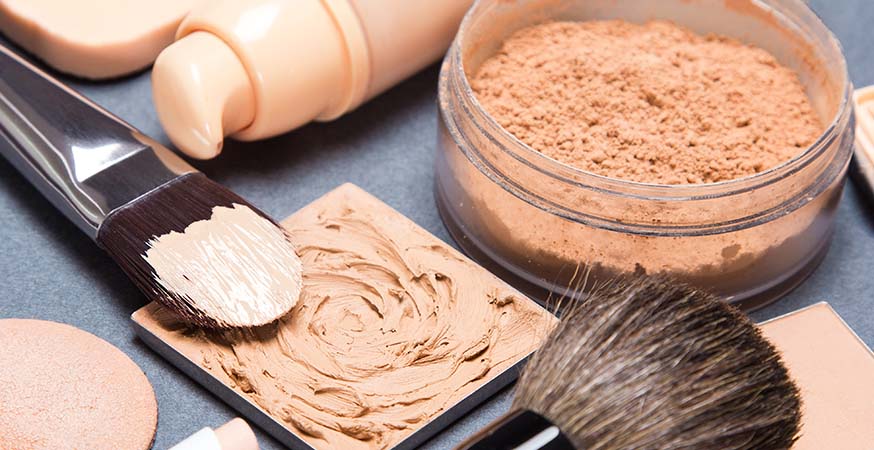People with oily skin may consider it an inconvenience, but in reality, they are in a much better position than those with dry skin. They have a natural highlighter, their skin ages better, and their faces don’t hurt in the cold weather.
However, while there are numerous benefits of having oily skin, there are some downsides as well, mainly to those who love to wear makeup. It can smudge, wear off, and shine much faster than with those with normal skin. Luckily, nowadays you can find numerous foundations formulated specifically for people with oily skin.
What to Look for in a Foundation for Oily Skin
The first question to ask is, what should I look for in a foundation for oily skin?
Oily skin is quite specific as it requires a special type of foundation which will prevent shine, give you flawless matte skin, and not cause acne.
First off, avoid products that contain alcohol which can dry out your skin, and make it produce more oil than usual.
Choose long-wear foundations, as they will not smudge or fade away so easily. Steer clear of luminizers or shimmers, because they can emphasize your pores and make the skin look oilier than it is. If possible, go for a non-comedogenic formula, and avoid dewy formulas.
Read the labels and look for phrases such as pore blurring, smooth blending, shine control, oil-free, mineral oil-free, fragrance-free, long-wear, oil control, mattifying, and poreless.
Is Powder or Liquid Foundation Better for Oily Skin?
The next question to ask is, which type of formula should you get? Powder or liquid foundation for oily skin?
In the past, liquid foundations were not recommended for oily skin as they clogged the pores and caused acne. While some foundations can still do that, the situation is much better, and the formulas of these makeup products are much healthier for the skin.
Still, if your skin is oily, you may benefit more from a powder foundation instead of the liquid one. The powder will not clog the pores, and it can also absorb some of the excess oil and reduce shine. It is also easy to re-apply during the day if necessary. Just make sure to stay away from mineral foundations.
Should You Use a Makeup Primer for Oily Skin?
One of the most discussed makeup products is primer, and whether it is necessary or not. For oily skin, primers are generally recommended, as they will be able to smooth the skin, hide the pores, and make a good canvas on which the foundation can go.
If you are using a liquid foundation, opt for a good primer as well, and look for one formulated for oily skin to promote foundation longevity.
How to Apply Foundation for Oily Skin
The key to the long-lasting, flawless foundation is a thorough application process.
Before you slap on some foundation on your face and call it a day, make sure to cleanse your face thoroughly. You need a clean and hydrated canvas to work with, so use a gentle cleanser and pat your face dry with a clean (emphasis on clean) towel.
Next, tone and moisturize your skin. Toner will remove some of the excess oils without drying out your face, so make sure to use an alcohol-free toner. Oily skin needs to be properly moisturized so it can stop producing so much oil. Use a light, oil-free moisturizer, preferably one with mattifying and shine reducing properties.
After the second step, it is time to prime. You can use a mattifying, oil-free primer to create a smooth canvas on which your foundation can go. Conceal the blemishes with a matte concealer, but opt for the liquid ones instead of cream or stick, since they can clog your pores easier.
Finally, grab your oily skin-friendly foundation. Do not use your fingers to apply it, since you can add more oil to your face from the surface of your phalanges. Instead, opt for a beauty blender or a foundation brush, but make sure to clean them before use.
After your foundation, apply translucent loose finishing powder to set the foundation and prevent shine and fading. Use a brush to apply powder and move on to the rest of your makeup routine.
Makeup Tips for Oily Skin
It is not recommended that you use cream contouring and highlighting products. Instead, use powders to achieve the same goal. This way, you are ensuring that you are not adding heavy products to your face and clogging your pores.
However, since you will be using many powder products, use a setting spray to refresh the face and lose that powdery finish look. As always, avoid shimmery products for the face. If you are using blush, opt for a matte version which will reduce shine.
Throughout the day, use blotting papers to soak up the excess oil that accumulates on your face. You can also re-apply a bit of powder, but do not go overboard and do not cake on the product, as it can make your face look worse, instead of better.
